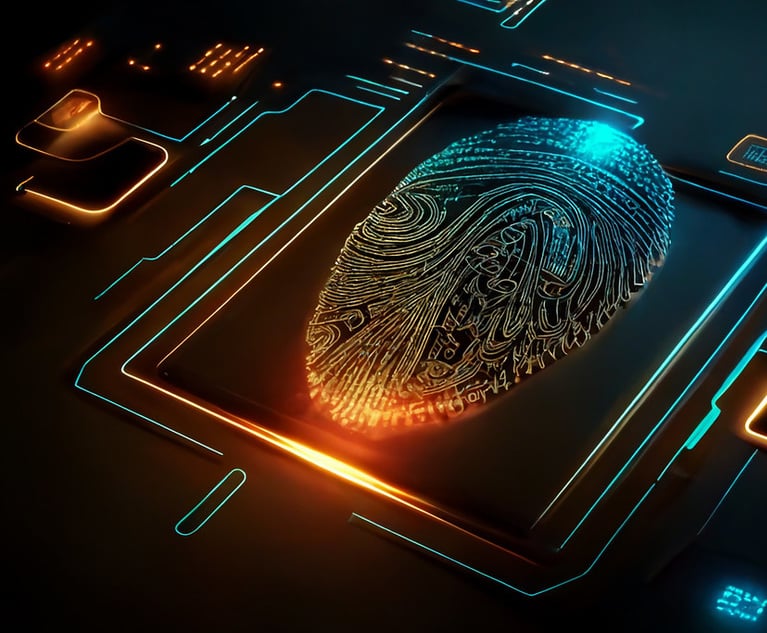 (Credit: Vadi Fuoco/Adobe Stock)
(Credit: Vadi Fuoco/Adobe Stock) White Castle Settlement Is a 'Seminal Moment' for BIPA to Be Amended
Attorneys say Latrina Cothron v. White Castle Systems in the Illinois Supreme Court is the most significant and dangerous development in biometric legislation to date, making businesses vulnerable to bankruptcies and complicating existing BIPA settlements.
February 27, 2023 at 05:46 PM
4 minute read
The Biometric Information Privacy Act (BIPA) is perhaps one of the most far-reaching of data privacy guardrails in the plaintiffs bar's back pockets—and with a recent verdict, it is set to become more formidable than ever.
On Feb. 17, the Illinois Supreme Court significantly expanded the scope of BIPA in Latrina Cothron v. White Castle System by ruling that a separate claim can arise for damages every time a business collects biometric data from workers or consumers without their explicit permission. While the statute itself doesn't specify the terms of such claim accrual, White Castle argued that damages should only be paid for the initial unlawful scan. But in a split decision, the court held that White Castle could be liable to pay record-setting damages up to $17 billion accrued with every repeating claim.
This content has been archived. It is available through our partners, LexisNexis® and Bloomberg Law.
To view this content, please continue to their sites.
Not a Lexis Subscriber?
Subscribe Now
Not a Bloomberg Law Subscriber?
Subscribe Now
NOT FOR REPRINT
© 2025 ALM Global, LLC, All Rights Reserved. Request academic re-use from www.copyright.com. All other uses, submit a request to [email protected]. For more information visit Asset & Logo Licensing.
You Might Like
View AllLaw Firms Mentioned
Trending Stories
- 1Pogo Stick Maker Wants Financing Company to Pay $20M After Bailing Out Client
- 2Goldman Sachs Secures Dismissal of Celebrity Manager's Lawsuit Over Failed Deal
- 3Trump Moves to Withdraw Applications to Halt Now-Completed Sentencing
- 4Trump's RTO Mandate May Have Some Gov't Lawyers Polishing Their Resumes
- 5A Judge Is Raising Questions About Docket Rotation
Who Got The Work
J. Brugh Lower of Gibbons has entered an appearance for industrial equipment supplier Devco Corporation in a pending trademark infringement lawsuit. The suit, accusing the defendant of selling knock-off Graco products, was filed Dec. 18 in New Jersey District Court by Rivkin Radler on behalf of Graco Inc. and Graco Minnesota. The case, assigned to U.S. District Judge Zahid N. Quraishi, is 3:24-cv-11294, Graco Inc. et al v. Devco Corporation.
Who Got The Work
Rebecca Maller-Stein and Kent A. Yalowitz of Arnold & Porter Kaye Scholer have entered their appearances for Hanaco Venture Capital and its executives, Lior Prosor and David Frankel, in a pending securities lawsuit. The action, filed on Dec. 24 in New York Southern District Court by Zell, Aron & Co. on behalf of Goldeneye Advisors, accuses the defendants of negligently and fraudulently managing the plaintiff's $1 million investment. The case, assigned to U.S. District Judge Vernon S. Broderick, is 1:24-cv-09918, Goldeneye Advisors, LLC v. Hanaco Venture Capital, Ltd. et al.
Who Got The Work
Attorneys from A&O Shearman has stepped in as defense counsel for Toronto-Dominion Bank and other defendants in a pending securities class action. The suit, filed Dec. 11 in New York Southern District Court by Bleichmar Fonti & Auld, accuses the defendants of concealing the bank's 'pervasive' deficiencies in regards to its compliance with the Bank Secrecy Act and the quality of its anti-money laundering controls. The case, assigned to U.S. District Judge Arun Subramanian, is 1:24-cv-09445, Gonzalez v. The Toronto-Dominion Bank et al.
Who Got The Work
Crown Castle International, a Pennsylvania company providing shared communications infrastructure, has turned to Luke D. Wolf of Gordon Rees Scully Mansukhani to fend off a pending breach-of-contract lawsuit. The court action, filed Nov. 25 in Michigan Eastern District Court by Hooper Hathaway PC on behalf of The Town Residences LLC, accuses Crown Castle of failing to transfer approximately $30,000 in utility payments from T-Mobile in breach of a roof-top lease and assignment agreement. The case, assigned to U.S. District Judge Susan K. Declercq, is 2:24-cv-13131, The Town Residences LLC v. T-Mobile US, Inc. et al.
Who Got The Work
Wilfred P. Coronato and Daniel M. Schwartz of McCarter & English have stepped in as defense counsel to Electrolux Home Products Inc. in a pending product liability lawsuit. The court action, filed Nov. 26 in New York Eastern District Court by Poulos Lopiccolo PC and Nagel Rice LLP on behalf of David Stern, alleges that the defendant's refrigerators’ drawers and shelving repeatedly break and fall apart within months after purchase. The case, assigned to U.S. District Judge Joan M. Azrack, is 2:24-cv-08204, Stern v. Electrolux Home Products, Inc.
Featured Firms
Law Offices of Gary Martin Hays & Associates, P.C.
(470) 294-1674
Law Offices of Mark E. Salomone
(857) 444-6468
Smith & Hassler
(713) 739-1250






